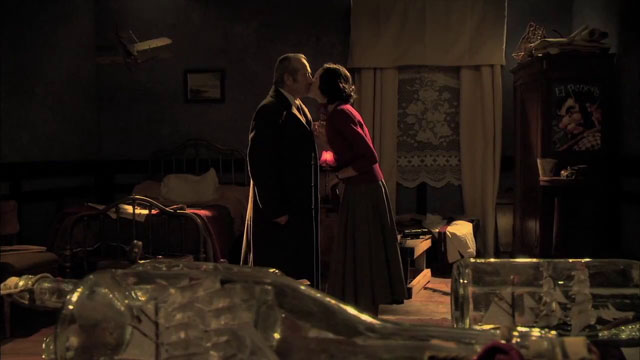The San Francisco Film Society announced yesterday that Ted Hope would be its new executive director: “In a surprise move, the veteran film producer and one of the most influential individuals in independent film will embark upon a new chapter in his professional life, leaving New York City, where he produced independent films through his companies Good Machine, This is That corporation and Double Hope Films, to lead the Film Society into the future.” Says Hope: “The film world—be it in content, creation, business or audience—has changed significantly over the last twenty years and we all must change with it. It’s time that the film industry looked not just to Hollywood but instead to the Bay Area and Silicon Valley, and San Francisco Film Society is a major artistic voice positioned right in the heart of this vibrant cultural location.”

In other news. “The Toronto International Film Festival unveiled its Canadian lineup Wednesday, including new work from Sarah Polley, Bruce Sweeney, Xavier Dolan, Michael McGowan and Bernard Émond,” reports Brian Brooks for Movieline. This round of 19 titles “will screen in the September festival’s various sections. The lineup also spotlights first-time feature work from Jason Buxton, Brandon Cronenberg, Igor Drljaca and Kate Melville.” The festival runs from September 6 through 16.
The 69th Venice Film Festival, running August 29 through September 8, has added four titles; we already knew that Paul Thomas Anderson’s The Master had been added to the Competition. The three other new films will be screening Out of Competition: Ermanno Olmi’s Come voglio che sia il mio futuro?, completed by Maurizio Zaccaro; Pasquale Scimeca’s tribute to Giovanni Falcone, Convitto Falcone (Collateral Event); and Alex Schmidt’s debut feature Du hast es versprochen (Forgotten), a horror story to be screened at midnight.
“Raúl Ruiz’s final film, Night Across the Street (La Noche de Enfrente), has been acquired by Cinema Guild for US distribution,” reports Sophia Savage for indieWIRE. “The film—described as a film about an old office worker who relives both real and imagined memories from his life, while on the verge of retirement—will be released theatrically early 2013. It debuted earlier this year at Cannes in the Director’s Fortnight.”
“Bob Hoskins is to retire from acting following a diagnosis of Parkinson’s disease last autumn, it was announced on Wednesday.” Catherine Shoard reports for the Guardian.
Reading. The latest issue of Alphaville, “just out,” notes Catherine Grant, “treats the important topic of sound, voice and music in film and television and boasts some excellent contributions.”
Laurent Kretzschmar and Bill Krohn have translated Serge Daney‘s 1983 piece for Cahiers du cinéma on Jerry Lewis.
The New Yorker‘s Richard Brody weighs the chances of a director succeeding at adapting a great book.
From the BFI: “With the Genius of Hitchcock season unveiling the results of our Rescue the Hitchcock 9 project to restore the director’s surviving silent features, curator Bryony Dixon explains how a restoration begins.” Also: Nathalie Morris captions a series of behind-the-scenes photos from Hitchcock’s sets.
In the New York Times, A.O. Scott and Manohla Dargis “discuss the surprises of the counterprogrammed, counterintuitive summer of 2012.”
New York. Lip-Reading Puppets: The Curators’ Prescription for Deciphering the Quay Brothers is MoMA’s film series running from today through January 7 in conjunction with the exhibition Quay Brothers: On Deciphering the Pharmacist’s Prescription for Lip-Reading Puppets, opening on Sunday. Together, they tell “a joint life story mingling nigh-mythic self-creation with restless creative adventuring through the worlds of graphic art, theatrical design, and filmmaking,” as Kyle Chayka puts it for Artinfo.
American Gagsters: Great Comedy Teams opened yesterday at BAM and runs through September 17. “An everything-including-the-kitchen-sink sampler platter, this 50-film program… whips through six decades of celluloid funny business in six weeks.” Time Out New York‘s David Fear, Joshua Rothkopf, and Keith Uhlich pick out several highlights. At the L, Steve Macfarlane recommends Leo McCarey‘s The Awful Truth (1937), screening on Sunday.
“Just because it made loads of money, stars Arnold Schwarzenegger, and features a three-titted mutant doesn’t mean Total Recall isn’t ruggedly individualistic art,” writes Nick Pinkerton in the Voice. “Just look at its outsider pedigree: Total Recall was loosely based on a 1966 short story from the flushed mind of Philip K. Dick, produced by the buccaneer Hungarian/Lebanese producers behind Carolco Pictures, and directed by Paul Verhoeven, the Dutch émigré who’d just profitably spoofed America’s security-industrial complex with 1987’s RoboCop.” The original returns to Film Forum for a week-long run starting tomorrow, and in the L, Vadim Rizov argues that “screenwriters Dan O’Bannon and Ronald Shusett expanded on the logic of their earlier Alien, in which a corporation casually endangers its workers for the profit of the bottom-line”:
The irony of using corporate cash to make an anti-corporate film for the ultimate goal of corporate profit isn’t lost on Verhoeven, who turns the omnipresent product placement to his thematic favor: in a world run by such horrible, remorseless, people, the mise-en-scene prominence accorded Pepsi seems more ominous than cutely crass. Arnold’s heroic delusions are vindicated, though others try to make him think he’s insane: is it likely, he’s asked, that he’s “the victim of an international conspiracy to make him think he’s a lowly construction worker”? That’s a decent working definition of Marxism, and the answer is “yes, actually.” Total Recall is, effectively, an incitement to mild class warfare which insists minimum-wage workers deserve more respect, rather than expecting constantly patronizing rhetoric to make their labor more unpleasant than necessary.
The Art of Brooklyn Film is on through Sunday.
San Francisco. “Really, you might ask, does there need to be a book devoted to full color reproductions of posters from the ‘golden age’ (circa 1971-82) of XXX features?” Dennis Harvey‘s answer: “Ohhhh yes.” His teaser in the Bay Guardian for Jacques Boyreau’s Sexytime: The Post-Porn Rise of the Pornoisseur segues into an overview of the Pop art-themed series of Thursday night double bills at the Vortex.
Los Angeles. The LAT‘s Susan King previews The Two Faces of Jean, a series at the UCLA Film & Television Archive celebrating Jean Arthur, opening tomorrow and running through September 28.
Holly Shorts opens today and runs through next Thursday.
Berlin. A week of docs is screening at the fsk-Kino and Eiszeit.
In the works. Marjane Satrapi (Persepolis, Chicken with Plums) has signed on to direct her first English language, live-action film, The Voices, “a Black List script written by Michael R. Perry (Paranormal Activity 2) that details a disturbed factory worker who goes on and off his medications,” reports Lucas Shaw for TheWrap.
Luc Besson’s action comedy Malavita will feature Robert De Niro, Michelle Pfeiffer, and Tommy Lee Jones, reports Dave Lewis at HitFix.
Obit. “Judith Crist, one of America’s most widely read film critics for more than three decades and a provocative presence in millions of homes as a regular reviewer on the Today show, died Tuesday at her home in Manhattan,” report Douglas Martin in the New York Times. “A Harris Poll of moviegoers in the 1960s cited her as their favorite critic. In 1968, Film Quarterly called her ‘the American critic with the widest impact on the mass audience.’ When TV Guide decided to dismiss her in 1983 to replace her column with a computerized movie summary, executives told her they might come crawling back to her in six months to beg her to return. The magazine was deluged with letters, and asked her back three weeks later. She was given a raise and stayed until 1988…. In a 1985 interview with The Christian Science Monitor, she insisted that a true movie fan takes James Bond as seriously as ‘the grand auteurism of Bergman.’ Yet many of her largest bouquets went to the most individualistic of directors, auteurs like Truffaut, Bergman, Fellini, Kurosawa, Satyajit Ray and David Lean. Her American favorites included Stanley Kubrick, Mel Brooks, John Cassavetes and Robert Altman.”
More from Daphnee Denis (Slate), Joe Leydon, Matt Singer (Criticwire) and Jen Yamato (Movieline). Crist was 90.
For news and tips throughout the day every day, follow @KeyframeDaily on Twitter and/or the RSS feed. Get Keyframe Daily in your inbox by signing in at fandor.com/daily.






